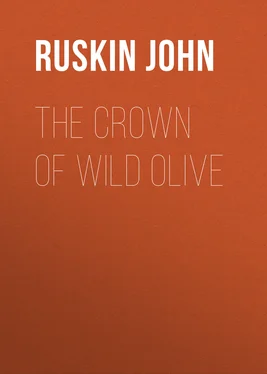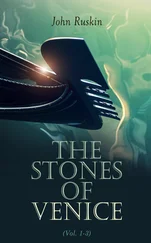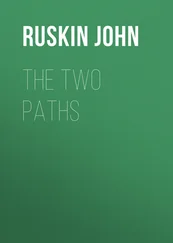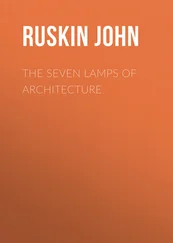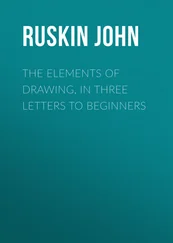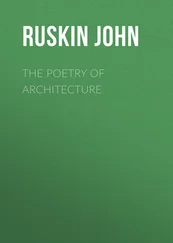John Ruskin - The Crown of Wild Olive
Здесь есть возможность читать онлайн «John Ruskin - The Crown of Wild Olive» — ознакомительный отрывок электронной книги совершенно бесплатно, а после прочтения отрывка купить полную версию. В некоторых случаях можно слушать аудио, скачать через торрент в формате fb2 и присутствует краткое содержание. Жанр: foreign_antique, foreign_home, literature_19, visual_arts, на английском языке. Описание произведения, (предисловие) а так же отзывы посетителей доступны на портале библиотеки ЛибКат.
- Название:The Crown of Wild Olive
- Автор:
- Жанр:
- Год:неизвестен
- ISBN:нет данных
- Рейтинг книги:4 / 5. Голосов: 1
-
Избранное:Добавить в избранное
- Отзывы:
-
Ваша оценка:
- 80
- 1
- 2
- 3
- 4
- 5
The Crown of Wild Olive: краткое содержание, описание и аннотация
Предлагаем к чтению аннотацию, описание, краткое содержание или предисловие (зависит от того, что написал сам автор книги «The Crown of Wild Olive»). Если вы не нашли необходимую информацию о книге — напишите в комментариях, мы постараемся отыскать её.
The Crown of Wild Olive — читать онлайн ознакомительный отрывок
Ниже представлен текст книги, разбитый по страницам. Система сохранения места последней прочитанной страницы, позволяет с удобством читать онлайн бесплатно книгу «The Crown of Wild Olive», без необходимости каждый раз заново искать на чём Вы остановились. Поставьте закладку, и сможете в любой момент перейти на страницу, на которой закончили чтение.
Интервал:
Закладка:
THE CROWN OF WILD OLIVE
LECTURE I
My Friends,—I have not come among you to-night to endeavour to give you an entertaining lecture; but to tell you a few plain facts, and ask you some plain, but necessary questions. I have seen and known too much of the struggle for life among our labouring population, to feel at ease, even under any circumstances, in inviting them to dwell on the trivialities of my own studies; but, much more, as I meet to-night, for the first time, the members of a working Institute established in the district in which I have passed the greater part of my life, I am desirous that we should at once understand each other, on graver matters. I would fain tell you, with what feelings, and with what hope, I regard this Institution, as one of many such, now happily established throughout England, as well as in other countries;—Institutions which are preparing the way for a great change in all the circumstances of industrial life; but of which the success must wholly depend upon our clearly understanding the circumstances and necessary limits of this change. No teacher can truly promote the cause of education, until he knows the conditions of the life for which that education is to prepare his pupil. And the fact that he is called upon to address you nominally, as a 'Working Class,' must compel him, if he is in any wise earnest or thoughtful, to inquire in the outset, on what you yourselves suppose this class distinction has been founded in the past, and must be founded in the future. The manner of the amusement, and the matter of the teaching, which any of us can offer you, must depend wholly on our first understanding from you, whether you think the distinction heretofore drawn between working men and others, is truly or falsely founded. Do you accept it as it stands? do you wish it to be modified? or do you think the object of education is to efface it, and make us forget it for ever?
Let me make myself more distinctly understood. We call this—you and I—a 'Working Men's' Institute, and our college in London, a 'Working Men's' College. Now, how do you consider that these several institutes differ, or ought to differ, from 'idle men's' institutes and 'idle men's' colleges? Or by what other word than 'idle' shall I distinguish those whom the happiest and wisest of working men do not object to call the 'Upper Classes?' Are there really upper classes,—are there lower? How much should they always be elevated, how much always depressed? And, gentlemen and ladies—I pray those of you who are here to forgive me the offence there may be in what I am going to say. It is not I who wish to say it. Bitter voices say it; voices of battle and of famine through all the world, which must be heard some day, whoever keeps silence. Neither is it to you specially that I say it. I am sure that most now present know their duties of kindness, and fulfil them, better perhaps than I do mine. But I speak to you as representing your whole class, which errs, I know, chiefly by thoughtlessness, but not therefore the less terribly. Wilful error is limited by the will, but what limit is there to that of which we are unconscious?
Bear with me, therefore, while I turn to these workmen, and ask them, also as representing a great multitude, what they think the 'upper classes' are, and ought to be, in relation to them. Answer, you workmen who are here, as you would among yourselves, frankly; and tell me how you would have me call those classes. Am I to call them—would you think me right in calling them—the idle classes? I think you would feel somewhat uneasy, and as if I were not treating my subject honestly, or speaking from my heart, if I went on under the supposition that all rich people were idle. You would be both unjust and unwise if you allowed me to say that;—not less unjust than the rich people who say that all the poor are idle, and will never work if they can help it, or more than they can help.
For indeed the fact is, that there are idle poor and idle rich; and there are busy poor and busy rich. Many a beggar is as lazy as if he had ten thousand a year; and many a man of large fortune is busier than his errand-boy, and never would think of stopping in the street to play marbles. So that, in a large view, the distinction between workers and idlers, as between knaves and honest men, runs through the very heart and innermost economies of men of all ranks and in all positions. There is a working class—strong and happy—among both rich and poor; there is an idle class—weak, wicked, and miserable—among both rich and poor. And the worst of the misunderstandings arising between the two orders come of the unlucky fact that the wise of one class habitually contemplate the foolish of the other. If the busy rich people watched and rebuked the idle rich people, all would be right; and if the busy poor people watched and rebuked the idle poor people, all would be right. But each class has a tendency to look for the faults of the other. A hard-working man of property is particularly offended by an idle beggar; and an orderly, but poor, workman is naturally intolerant of the licentious luxury of the rich. And what is severe judgment in the minds of the just men of either class, becomes fierce enmity in the unjust—but among the unjust only . None but the dissolute among the poor look upon the rich as their natural enemies, or desire to pillage their houses and divide their property. None but the dissolute among the rich speak in opprobrious terms of the vices and follies of the poor.
There is, then, no class distinction between idle and industrious people; and I am going to-night to speak only of the industrious. The idle people we will put out of our thoughts at once—they are mere nuisances—what ought to be done with them , we'll talk of at another time. But there are class distinctions, among the industrious themselves; tremendous distinctions, which rise and fall to every degree in the infinite thermometer of human pain and of human power—distinctions of high and low, of lost and won, to the whole reach of man's soul and body.
These separations we will study, and the laws of them, among energetic men only, who, whether they work or whether they play, put their strength into the work, and their strength into the game; being in the full sense of the word 'industrious,' one way or another—with a purpose, or without. And these distinctions are mainly four:
I. Between those who work, and those who play.
II. Between those who produce the means of life, and those who consume them.
III. Between those who work with the head, and those who work with the hand.
IV. Between those who work wisely, and who work foolishly.
For easier memory, let us say we are going to oppose, in our examination.—
I. Work to play;
II. Production to consumption;
III. Head to Hand; and,
IV. Sense to nonsense.
I. First, then, of the distinction between the classes who work and the classes who play. Of course we must agree upon a definition of these terms,—work and play,—before going farther. Now, roughly, not with vain subtlety of definition, but for plain use of the words, 'play' is an exertion of body or mind, made to please ourselves, and with no determined end; and work is a thing done because it ought to be done, and with a determined end. You play, as you call it, at cricket, for instance. That is as hard work as anything else; but it amuses you, and it has no result but the amusement. If it were done as an ordered form of exercise, for health's sake, it would become work directly. So, in like manner, whatever we do to please ourselves, and only for the sake of the pleasure, not for an ultimate object, is 'play,' the 'pleasing thing,' not the useful thing. Play may be useful in a secondary sense (nothing is indeed more useful or necessary); but the use of it depends on its being spontaneous.
Читать дальшеИнтервал:
Закладка:
Похожие книги на «The Crown of Wild Olive»
Представляем Вашему вниманию похожие книги на «The Crown of Wild Olive» списком для выбора. Мы отобрали схожую по названию и смыслу литературу в надежде предоставить читателям больше вариантов отыскать новые, интересные, ещё непрочитанные произведения.
Обсуждение, отзывы о книге «The Crown of Wild Olive» и просто собственные мнения читателей. Оставьте ваши комментарии, напишите, что Вы думаете о произведении, его смысле или главных героях. Укажите что конкретно понравилось, а что нет, и почему Вы так считаете.
